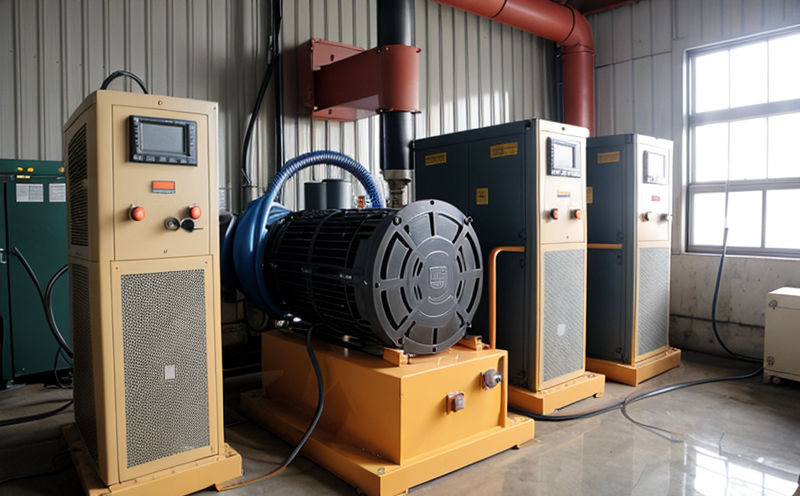ASTM D7348 Loss on Ignition Testing in Ash Residues
The ASTM D7348 loss on ignition (LOI) test is an essential procedure for assessing the ash content of solid fuels and materials used in power generation. This testing method measures the weight loss when a sample is subjected to controlled heating, which helps determine the percentage of combustible material present.
Power generation equipment often deals with various types of fuel such as coal, biomass, and other solid waste materials that are processed into ash residues after combustion. The quality of these fuels directly impacts boiler efficiency and the overall performance of power plants. By performing ASTM D7348 testing, operators can ensure they are using high-quality fuels that meet regulatory requirements and improve operational efficiency.
The test involves heating a known mass of the fuel sample to a specified temperature (typically 950°C ± 10°C) for a fixed period under controlled conditions. The weight loss observed during this process is attributed to volatile components evaporating or combusting, leaving behind inorganic ash residues. Accurate measurement of LOI provides valuable insights into the combustibility and potential performance issues associated with different fuel types.
For quality managers and compliance officers at power plants, understanding ASTM D7348 helps them maintain strict control over fuel quality, ensuring consistent performance across all units while meeting environmental standards set by regulatory bodies like the EPA in the United States or the EC in Europe. R&D engineers rely on this test to develop new fuels that have optimal LOI values for improved combustion efficiency.
LOI tests also play a crucial role during procurement processes, helping companies select reliable suppliers who deliver consistent fuel quality. By incorporating ASTM D7348 into their testing protocols, organizations can enhance the reliability of their energy production processes and contribute to sustainability goals by reducing waste and emissions.
Scope and Methodology
| Aspect | Description |
|---|---|
| Sample Preparation | The sample must be representative of the fuel or ash residue being tested. It should consist of finely ground particles with a uniform size distribution, free from contaminants that could affect the test results. |
| Heating Conditions | A controlled environment furnace is used where the sample is heated to 950°C ±10°C for exactly one hour. The temperature and duration are critical parameters ensuring reproducible results. |
| Weighing Equipment | An analytical balance accurate to at least ±0.0002 g is used to measure the initial mass of the sample before heating and its weight after cooling down to room temperature. |
| Standard Operating Procedures (SOPs) | The procedure follows strict guidelines outlined in ASTM D7348, which includes detailed instructions on handling samples, operating equipment safely, recording data accurately, and interpreting results correctly. |
| Data Analysis | The difference between the initial mass of the sample and its post-heating weight is reported as a percentage of original mass. This value represents the LOI, which indicates the amount of combustible material in the fuel or ash residue. |
These stringent procedures ensure that the test results are reliable and comparable across different laboratories, providing consistent data for decision-making purposes within power generation facilities.
Industry Applications
The ASTM D7348 loss on ignition testing is widely used in various sectors of the energy industry. One key application lies in coal-fired power plants, where accurate measurement of LOI helps optimize fuel usage and enhance boiler efficiency. By understanding the exact composition of fuels like anthracite or bituminous coal, operators can fine-tune combustion processes to maximize output while minimizing waste.
Biomass energy systems also benefit from ASTM D7348 testing as they handle diverse types of organic materials such as wood chips, crop residues, and municipal solid waste. These varied inputs require careful evaluation through LOI tests so that operators can select the most suitable feedstocks for their plants based on combustibility levels.
In addition to traditional fossil fuel-based power generation, renewable energy sources like geothermal or nuclear power stations may utilize this testing method when dealing with ash residues derived from these unconventional fuels. Such analyses enable better management of waste products while ensuring compliance with local environmental regulations.
Customer Impact and Satisfaction
Our clients in the power generation sector experience significant benefits when they adopt ASTM D7348 loss on ignition testing into their quality assurance programs. Improved fuel quality leads to increased boiler efficiency, reduced maintenance costs due to fewer operational issues caused by poor-quality fuels, and enhanced safety standards.
R&D teams appreciate our services because we provide them with accurate baseline data necessary for developing next-generation power generation technologies that are more efficient and environmentally friendly. For procurement departments, reliable LOI testing ensures they source high-performance fuel products from trusted suppliers, thus maintaining consistent product quality throughout their supply chains.
Customer satisfaction is paramount to us; therefore, we continuously strive to improve our service offerings by staying updated with the latest industry practices and adhering strictly to international standards like ASTM D7348. Our experienced technical staff ensures that all tests conducted meet or exceed these rigorous requirements, delivering precise results every time.





